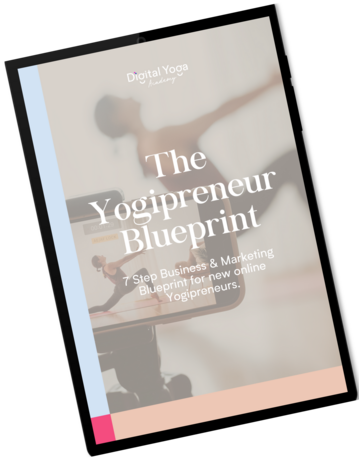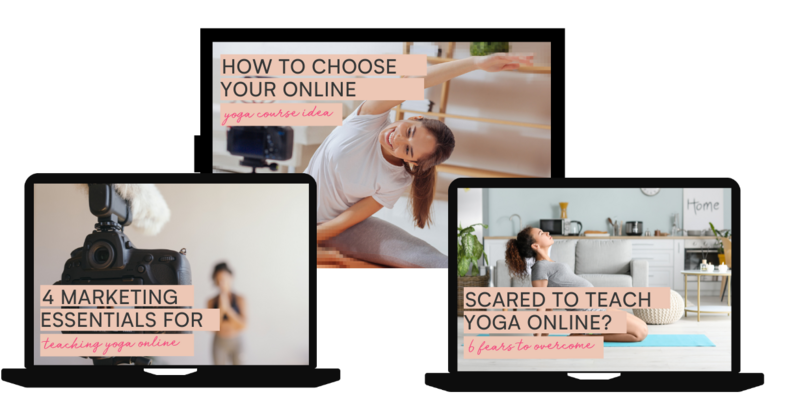Online education is a booming industry that is here to stay and it is projected to be a trillion-dollar industry by 2028. If you are a yoga teacher who has been wondering if creating a yoga course is suitable for you and your business, this blog post is for you.
What is a course creator?
A course creator is an individual who creates online courses in order to take their students from point A (where they are currently) to point B (where they want to be ideally) and this process usually results in some form of outcome/ transformation.
There are course creators in every industry and niche. You can find online courses in jam making, calligraphy, video editing, singing, vegetable growing, fermenting, and even how to communicate with your animals telepathically.
This means that there is no limit as to what you can create a course on. As mentioned above the online education space is booming and will continue to grow which means that yoga and wellbeing truly have their own place within this space.
Now, here are 3 reasons why you as a yoga teacher am actually the most perfect course creator
Reason 1: You’ve had unique experiences and have used your yoga education to navigate them
Contrary to popular opinion, when creating an online course, you do not have to know everything there is to know about the course topic itself.
Many yoga teachers in The Profitable Yoga Teacher program have built their courses based on what they have experienced in their own lives. They have gone through challenging circumstances themselves and have used the modalities and practices of yoga to support them through those events.
Now they are using their experience to support their students to move through similar challenges and achieve desired outcomes and transformations.
Once you have gone through a challenging circumstance, you have the ability to guide your students and mentor them through similar circumstances. Having experienced it yourself, it gives you a unique perspective and helps you to guide your students in a more authentic manner than someone who has not experienced such circumstances and this makes you a perfect course creator!
Reason 2: You genuinely want to create an impact in the world
Many yoga teachers choose this path in life because they want to create an impact in the world. We are yet to meet a yoga teacher who hasn’t told us that they don’t want to make an impact on people’s lives.
You as a yoga teacher want to share your knowledge with others and you might notice this if you really
pay attention to the conversations that you have with your students and friends. By doing so, you will see that you have a special gift to share with the world.
We know that that’s why you became a yoga teacher and started this business journey that you’re on. We also know that if you are reading this right now you clearly have an interest in creating and launching your own online course.
This is something that usually stems from a deep passion and a calling and it’s no coincidence that you are here now on earth to support people and create an impact in 2022. This is another reason why you are the perfect course creator.
By creating a course, you are able to create a bigger impact for your students by providing them with a deeper transformation that you won’t be able to provide in a drop-in Zoom class setting.
Reason 3: You realize that learning never ends and you want to share that knowledge with others
Yoga teachers love to learn and we know that we will always be students on this journey and we are constantly wanting to learn more and go deeper into our journeys.
This drive for knowledge is another reason why you are the perfect online course creator. This also means that you are the perfect person to learn the business and marketing aspect of running a yoga business.
Learning the business and marketing aspects will not only allow you to share your deeper knowledge and teaching with more people – and create a bigger impact.
Summary
So, if you are a yoga teacher that is wondering if creating a yoga course is suitable for you and your business, we hope that this blog post has helped to show you that you are indeed the perfect course creator already.
If you want to create and launch your own online yoga course you can learn more inside The Profitable Yoga Teacher Program, a 6-month group business program for entrepreneurial yoga teachers starting on June 27th, 2022.
What type of Yogipreneur are you?
DISCOVER THE IMPACT YOU’RE HERE TO CREATE!
CURIOUS? CLICK HERE TO TAKE THE QUIZ
Join our private Facebook community today!
At Digital Yoga Academy we are passionate about helping yoga teachers, giving them the strategies, tools and support to build successful online yoga businesses!
The Digital Yoga Academy Facebook group is a community of thousands of yoga teachers all over the world.
There are weekly live trainings with Kelly McHugh, our founder & CEO, business talks with inspiring yoga teachers, daily educational content and loads of support.
Yet to get your classes online?
Discover the easy steps to take your classes online in this video training.
>>> Video training: How to thrive as a Yogipreneur in tough times
Follow us on Instagram
Subscribe to our Youtube channel
Like us on Facebook
Sign up to our mailing list







